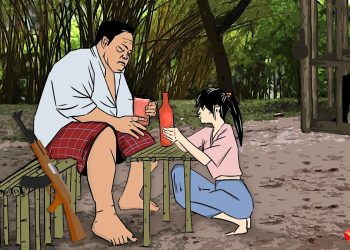RANGOON — Burmese politicians and journalists have taken different stances on the military coup in neighboring Thailand.
Nan Khin Htwe Myint, a central executive committee member of Burma’s main opposition party, the National League for Democracy (NLD), compared Thailand’s and Burma’s histories of military takeovers.
“In Thailand, once the country’s situation returns to normal, the army gives power back to the people. In Burma, it’s been different,” the NLD member said.
She urged the Burmese government, as chair of the Association of Southeast Asian Nations (Asean), to respond quickly to the Thai military’s takeover last Thursday.
“They still have failed to do so. I think they have delayed their response because of the army representatives in Parliament,” she said. Twenty-five percent of seats in the Burmese legislature are filled by unelected military representatives.
A lawmaker from the ruling Union Solidarity and Development Party (USDP), Hla Swe, agreed that “generally, a coup is not good.”
But the USDP lawmaker, who is also a former lieutenant major, said it was too early to tell whether the military takeover in Bangkok would be positive or negative. “The divide between the Red and Yellow shirts is so intense. Maybe the coup will be an answer for Thai politics. Let’s wait and see how soon the power goes back to the people.”
He added, “As the Asean chair, the [Burmese] government will respond soon.”
Myint Kyaw, secretary of the Myanmar Journalists Network, said intimidation of journalists by the Thai military seemed more intense over the past week than it had during the 2006 military takeover.
“If our Thai counterparts are brave enough to keep doing their jobs, we are ready to show our solidarity with them,” he said.
“I am against military coups. Political problems should be solved through political means,” he added. “The Burmese government is influenced by the military, so they may not be skeptical about the Thai coup.”
Jimmy, a leader of the 88 Generation Peace and Open Society, said he believed Thai politicians had a responsibility to stop the tradition of coups in a country that has seen 12 military coups in eight decades.
“Thailand is a leading country in Southeast Asia. I don’t want a coup in Thailand as a model for other Asean countries,” he said.
“It shows how national reconciliation is important. If it does not succeed, the army will always be involved in Thai politics. To become a fully-fledged democracy, Thailand shouldn’t have any coups. That’s up to politicians.”
He added, “The Burmese government needs to respond, as [President] Thein Sein is trumpeting Burma as heading toward democracy. He can’t remain silent.”

















